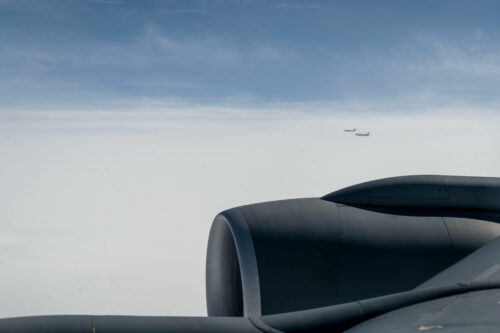The 22nd Air Refueling Wing (ARW) at McConnell Air Force Base has successfully completed Project Magellan, marking the first-ever non-stop, westbound circumnavigation flight by a KC-46 Pegasus aerial refueling tanker aircraft. The 45-hour mission, which began and ended at McConnell AFB on Jun. 29-Jul. 1, showcased the extended range and aerial refueling capabilities of the KC-46 while demonstrating innovative crew management strategies for long-duration missions.

Project Magellan is the latest Maximum Endurance Operation (MEO) undertaken by AMC to test the limits of the KC-46 and its crew. By demonstrating the ability to stay airborne for extended periods, the Air Mobility Command (AMC) aims to enhance its capacity for “Rapid Global Mobility,” enabling faster deployment of personnel and equipment across vast distances.
Achieving this historic feat required a coordinated effort between McConnell AFB and multiple other locations around the globe. Throughout the flight, the KC-46 received aerial refueling from a network of pre-positioned tankers, including two KC-46s stationed at Andersen Air Force Base, Guam, a KC-135 Stratotanker at RAF Mildenhall, England, and another KC-135 deployed to the U.S. Central Command Area of Responsibility. Additionally, a KC-135 from the 100th ARW at RAF Mildenhall and a deployed KC-135 from the Utah Air National Guard provided backup support.
The 45-hour flight demanded meticulous planning and execution to ensure crew safety and performance. The KC-46 carried a crew of four pilots and two boom operators who took turns resting in the aircraft’s built-in bunks. A flight surgeon monitored the crew’s health and well-being throughout the mission, while a fatigue study, conducted in collaboration with a third-party contractor, provided valuable data on human performance during extended flights.
The successful completion of Project Magellan represents a significant milestone for the KC-46 program. It demonstrates the aircraft’s potential to revolutionize aerial refueling capabilities and support the Air Force’s global reach. The lessons learned from crew management and fatigue mitigation strategies during the mission will be crucial for informing future MEOs and ensuring the continued success of long-duration air operations.
Col. Cory Damon, Commander of the 22nd ARW, and Brig. Gen. Gerald Donohue, Director of Operations at Headquarters Air Mobility Command, issued a joint statement emphasizing the importance of Project Magellan. Colonel Damon praised the crew’s “incredible resilience and professionalism” and called the mission “a shining example of the critical role our tankers play in providing fuel and support to the Joint Force.” Brigadier General Donohue echoed this sentiment, stating that “learning in training mitigates risk in crisis,” and that Project Magellan provided valuable insights for enhancing human performance during MEOs.
For more information, hit the Source below